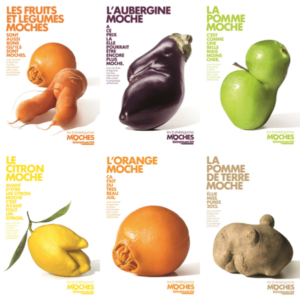3 Food Waste Facts About France’s Ugly Produce Campaign

“The ugly apple: it’s like a beautiful apple, but cheaper.”; “The ugly orange: it makes great juice.”; “The ugly lemon: before being an ugly lemon, it’s first and foremost a lemon.” No, this isn’t a new philosophy or a series of fruit-centric haikus. It’s actually a commercial campaign used by one of France’s largest supermarket chains to bring cheaper healthy food to the masses… and it’s working. Intermarché has started bringing ugly — or ‘inglorious’ produce to the French public at a fraction of the price after food waste facts awoke concerns in France and throughout Europe. And French consumers are eating it right up.
This innovative technique recycles produce that is usually thrown away — healthy food that may not adhere exactly to the aesthetics one expects, but that otherwise poses no problem in nutrition or in flavor. The key to the success of this movement has been the marketing campaign that went along with it, with posters of ugly fruits and vegetables with catchy slogans. But first things first… how did Fruits et légumes moches or ugly fruits and vegetables get its start?
1. The Problem
Like many great ideas, this one started with a problem: the problem was produce that was irregular in size or form, too small, too big, too ugly. This otherwise delicious, healthy food was deemed unmarketable, leading to some fairly unpalatable food waste facts, as the temporary solution in France — as it is in many countries — was to throw these fruits and vegetables out. That solution, in and of itself, was a problem.
From harvest to sale, 40 percent of the production volume of French agriculture was being destroyed for not conforming to norms of fruit and veggie beauty, and this number is similar in other European and American countries, where expectations and norms have most people selecting the most conventionally beautiful items, regardless of taste. In other words, food waste was becoming astronomical, and a new plan had to be put into place, sooner rather than later.
2. The Solution
The solution was simple: find a way to use up the healthy food that was being thrown away. Intermarché, the third largest supermarket chain in France, was up to the challenge. They sell these non-conforming “ugly” fruits and vegetables, produce that would usually simply be thrown away, at a 30 percent reduced price of their “pretty” counterparts. This isn’t limited merely to the produce itself; the supermarket also manufactured juices and soups that show how tasty — if odd-looking — these ‘ugly’ fruits and veggies are.
The initiative was launched in March of 2014; in the first two days, 2.1 tons of fruits and vegetables per store on average were sold. While the campaign worked well at the store where it was launched in Provins, it has yet to expand to the hundreds of other stores throughout France. The good news is that consumers all over the country are demanding ugly, inglorious fruits and veggies after the success of this first campaign. Only time will tell when it comes to Intermarché’s next move.
3. The Bigger Picture
While this initiative was a victory in and of itself, it’s far from a stand-alone story. 2014 also marked the year that the European Commission decided to start working towards a solution to food waste and develop new food waste management programs. Every year, 300 million tons of food is wasted worldwide, and 24 percent of this waste is fruits and vegetables; those are food waste facts that simply cannot be ignored. This European food waste initiative is just one of the many ways that Europe — and the world — is working towards the goal of reducing food waste.
Similar initiatives to the Intermarché project are taking place in the US, with the Daily Table; movements amongst Brits call for similar initiatives in the UK. With the impact of CSAs, farmer’s markets and home growing, the desire for a picture-perfect apple is waning. Here’s hoping that soon, it’s what’s on the inside that will count for all shoppers, even in the produce aisle.
Top image courtesy of Intermarché
Related on Organic Authority
Cropmobster: A Site to Reduce Food Waste and Increase Community
5 (More) Kitchen Scraps for Regrowing Vegetables and Reducing Food Waste
Do Expiration Dates on Food Promote Waste?

